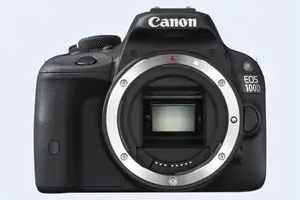Nikon D3100 vs Canon 100D
The Nikon D3100 and the Canon EOS 100D (labelled Canon SL1 in some countries) are two digital cameras that were officially introduced, respectively, in August 2010 and March 2013. Both are DSLR (Digital Single Lens Reflex) cameras that are equipped with an APS-C sensor. The Nikon has a resolution of 14.2 megapixels, whereas the Canon provides 17.9 MP.
Below is an overview of the main specs of the two cameras as a starting point for the comparison.

Check D3100 offers at
ebay.com

Check 100D offers at
ebay.com
Going beyond this snapshot of core features and characteristics, what are the differences between the Nikon D3100 and the Canon EOS 100D? Which one should you buy? Read on to find out how these two cameras compare with respect to their body size, their imaging sensors, their shooting features, their input-output connections, and their reception by expert reviewers.
Body comparison
The side-by-side display below illustrates the physical size and weight of the Nikon D3100 and the Canon 100D. The two cameras are presented according to their relative size. Three consecutive perspectives from the front, the top, and the back are available. All width, height and depth measures are rounded to the nearest millimeter.
The D3100 can be obtained in two different colors (black, red), while the 100D is also available in two color-versions, but different ones (black, white).
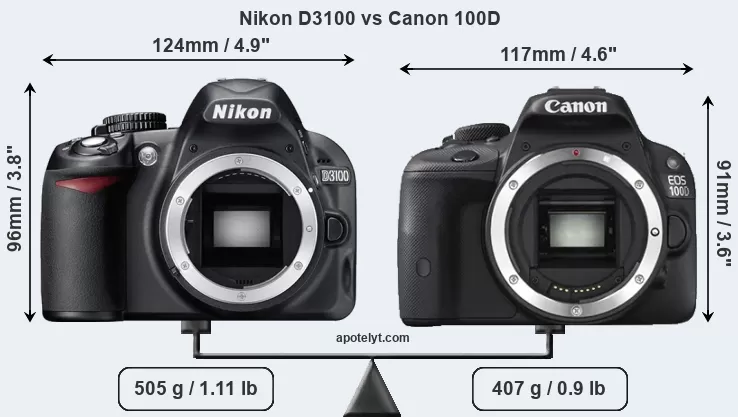
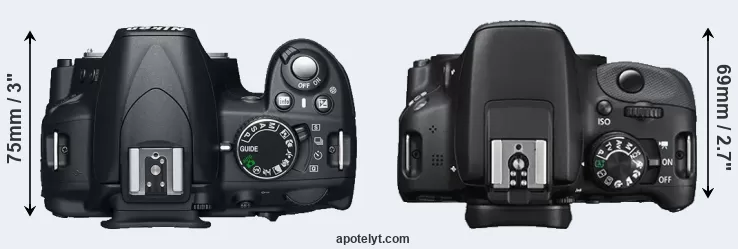
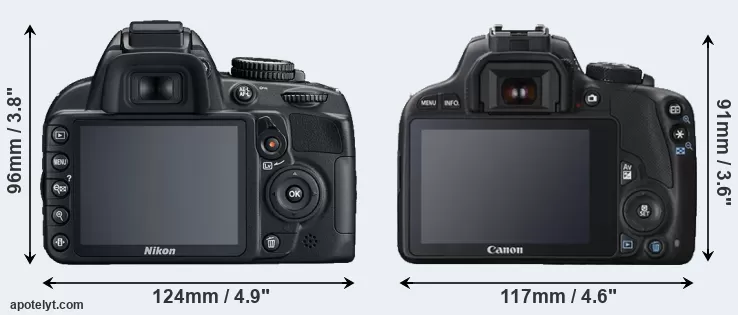
If the front view area (width x height) of the cameras is taken as an aggregate measure of their size, the Canon 100D is notably smaller (11 percent) than the Nikon D3100. Moreover, the 100D is markedly lighter (19 percent) than the D3100. In this context, it is worth noting that neither the D3100 nor the 100D are weather-sealed.
The above size and weight comparisons are to some extent incomplete since they do not consider the interchangeable lenses that both of these cameras require. Yet, since both cameras are based around an APS-C sensor, their respective lenses will tend to have similar dimensions and heft. You can compare the optics available for the two cameras in the Nikon Lens Catalog (D3100) and the Canon EF Lens Catalog (100D).
Concerning battery life, the D3100 gets 550 shots out of its Nikon EN-EL14 battery, while the 100D can take 380 images on a single charge of its Canon LP-E12 power pack.
The following table provides a synthesis of the main physical specifications of the two cameras and other similar ones. If you would like to visualize and compare a different camera combination, you can navigate to the CAM-parator app and make your selection from a broad list of cameras there.

| # | Camera Model |
Camera Width |
Camera Height |
Camera Depth |
Camera Weight |
Battery Life |
Weather Sealing |
Camera Launch |
Launch Price (USD) |
Street Price |
|
|---|---|---|---|---|---|---|---|---|---|---|---|
| 1. | Nikon D3100 | 124 mm | 96 mm | 75 mm | 505 g | 550 | n | Aug 2010 | 599 | ebay.com | |
| 2. | Canon 100D | 117 mm | 91 mm | 69 mm | 407 g | 380 | n | Mar 2013 | 549 | ebay.com | |
| 3. | Canon 200D | 122 mm | 93 mm | 70 mm | 453 g | 650 | n | Jun 2017 | 549 | ebay.com | |
| 4. | Canon 1200D | 130 mm | 100 mm | 78 mm | 480 g | 500 | n | Feb 2014 | 449 | ebay.com | |
| 5. | Canon 700D | 133 mm | 100 mm | 79 mm | 580 g | 440 | n | Mar 2013 | 649 | ebay.com | |
| 6. | Canon G16 | 109 mm | 76 mm | 40 mm | 356 g | 360 | n | Aug 2013 | 549 | ebay.com | |
| 7. | Nikon D3200 | 125 mm | 96 mm | 77 mm | 505 g | 540 | n | Apr 2012 | 599 | ebay.com | |
| 8. | Nikon D5100 | 128 mm | 97 mm | 79 mm | 560 g | 660 | n | Apr 2011 | 749 | ebay.com | |
| 9. | Nikon D7000 | 132 mm | 105 mm | 77 mm | 780 g | 1050 | Y | Sep 2010 | 1,499 | ebay.com | |
| 10. | Nikon D3000 | 126 mm | 97 mm | 64 mm | 536 g | 500 | n | Jul 2009 | 599 | ebay.com | |
| 11. | Nikon D5000 | 127 mm | 104 mm | 80 mm | 590 g | 510 | n | Apr 2009 | 749 | ebay.com | |
| 12. | Nikon D60 | 126 mm | 94 mm | 64 mm | 522 g | 500 | n | Jan 2008 | 629 | ebay.com | |
| 13. | Nikon D40X | 124 mm | 94 mm | 64 mm | 522 g | 520 | n | Mar 2007 | 729 | ebay.com | |
| 14. | Nikon D40 | 124 mm | 94 mm | 64 mm | 522 g | 470 | n | Nov 2006 | 499 | ebay.com | |
| 15. | Panasonic G6 | 122 mm | 85 mm | 71 mm | 390 g | 340 | n | Apr 2013 | 599 | ebay.com | |
| 16. | Sony NEX-5N | 111 mm | 59 mm | 38 mm | 269 g | 460 | n | Aug 2011 | 699 | ebay.com | |
| 17. | Sony NEX-C3 | 110 mm | 60 mm | 33 mm | 225 g | 400 | n | Jun 2011 | 599 | ebay.com | |
| Note: Measurements and pricing do not include easily detachable parts, such as add-on or interchangeable lenses or optional viewfinders. | |||||||||||
Any camera decision will obviously take relative prices into account. The manufacturer’s suggested retail prices give an idea on the placement of the camera in the maker’s lineup and the broader market. The 100D was somewhat cheaper (by 8 percent) than the D3100 at launch, but both cameras fall into the same price category. Normally, street prices remain initially close to the MSRP, but after a couple of months, the first discounts appear. Later in the product cycle and, in particular, when the replacement model is about to appear, further discounting and stock clearance sales often push the camera price considerably down. Then, after the new model is out, very good deals can frequently be found on the pre-owned market.
Sensor comparison
The size of the sensor inside a digital camera is one of the key determinants of image quality. All other things equal, a large sensor will have larger individual pixel-units that offer better low-light sensitivity, wider dynamic range, and richer color-depth than smaller pixels in a sensor of the same technological generation. Furthermore, a large sensor camera will give the photographer more possibilities to use shallow depth-of-field in order to isolate a subject from the background. On the downside, larger sensors are more costly to manufacture and tend to lead to bigger and heavier cameras and lenses.
Both cameras under consideration feature an APS-C sensor, but their sensors differ slightly in size. The sensor area in the 100D is 7 percent smaller. As a result of these sensor size differences, the cameras have format factors, respectively, of 1.5 (D3100) and 1.6. Both cameras have a native aspect ratio (sensor width to sensor height) of 3:2.
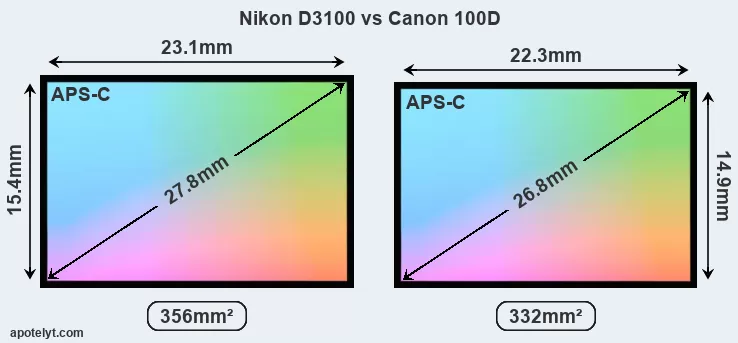
Despite having a smaller sensor, the 100D offers a higher resolution of 17.9 megapixels, compared with 14.2 MP of the D3100. This megapixels advantage comes at the cost of a higher pixel density and a smaller size of the individual pixel (with a pixel pitch of 4.31μm versus 5.01μm for the D3100). However, it should be noted that the 100D is much more recent (by 2 years and 7 months) than the D3100, and its sensor will have benefitted from technological advances during this time that make it possible to gather light more efficiently.
The resolution advantage of the Canon 100D implies greater flexibility for cropping images or the possibility to print larger pictures. The maximum print size of the 100D for good quality output (200 dots per inch) amounts to 25.9 x 17.3 inches or 65.8 x 43.9 cm, for very good quality (250 dpi) 20.7 x 13.8 inches or 52.7 x 35.1 cm, and for excellent quality (300 dpi) 17.3 x 11.5 inches or 43.9 x 29.3 cm. The corresponding values for the Nikon D3100 are 23 x 15.4 inches or 58.5 x 39 cm for good quality, 18.4 x 12.3 inches or 46.8 x 31.2 cm for very good quality, and 15.4 x 10.2 inches or 39 x 26 cm for excellent quality prints.
The 100D has on-sensor phase detect pixels, which results in fast and reliable autofocus acquisition even during live view operation.
The Nikon D3100 has a native sensitivity range from ISO 100 to ISO 3200, which can be extended to ISO 100-12800. The corresponding ISO settings for the Canon EOS 100D are ISO 100 to ISO 12800, with the possibility to increase the ISO range to 100-25600.
Technology-wise, both cameras are equipped with CMOS (Complementary Metal–Oxide–Semiconductor) sensors. Both cameras use a Bayer filter for capturing RGB colors on a square grid of photosensors. This arrangement is found in most digital cameras.
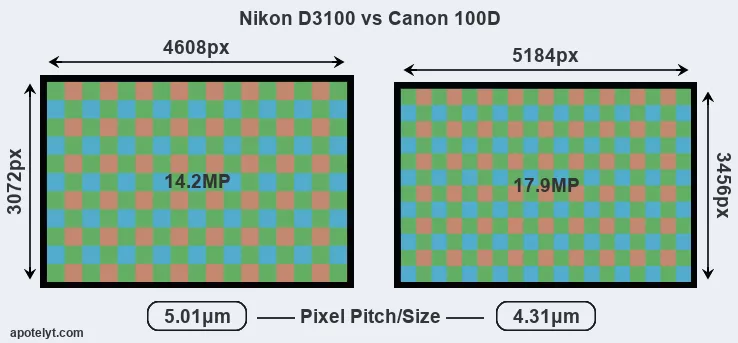
For many cameras, data on sensor performance has been reported by DXO Mark. This service is based on lab testing and assigns an overall score to each camera sensor, as well as ratings for dynamic range ("DXO Landscape"), color depth ("DXO Portrait"), and low-light sensitivity ("DXO Sports"). Of the two cameras under review, the D3100 has a notably higher overall DXO score than the 100D (overall score 4 points higher), which gives it an advantage in terms of imaging quality. This advantage is based on 0.7 bits higher color depth, and 0.1 stops in additional low light sensitivity. The adjacent table reports on the physical sensor characteristics and the outcomes of the DXO sensor quality tests for a sample of comparator-cameras.

| # | Camera Model |
Sensor Class |
Resolution (MP) |
Horiz. Pixels |
Vert. Pixels |
Video Format |
DXO Portrait |
DXO Landscape |
DXO Sports |
DXO Overall |
|
|---|---|---|---|---|---|---|---|---|---|---|---|
| 1. | Nikon D3100 | APS-C | 14.2 | 4608 | 3072 | 1080/24p | 22.5 | 11.3 | 919 | 67 | |
| 2. | Canon 100D | APS-C | 17.9 | 5184 | 3456 | 1080/30p | 21.8 | 11.3 | 843 | 63 | |
| 3. | Canon 200D | APS-C | 24.0 | 6000 | 4000 | 1080/60p | 23.6 | 13.4 | 1041 | 79 | |
| 4. | Canon 1200D | APS-C | 17.9 | 5184 | 3456 | 1080/30p | 21.9 | 11.3 | 724 | 63 | |
| 5. | Canon 700D | APS-C | 17.9 | 5184 | 3456 | 1080/30p | 21.7 | 11.2 | 681 | 61 | |
| 6. | Canon G16 | 1/1.7 | 12.0 | 4000 | 3000 | 1080/60p | 21.0 | 11.7 | 230 | 54 | |
| 7. | Nikon D3200 | APS-C | 24.1 | 6016 | 4000 | 1080/30p | 24.1 | 13.2 | 1131 | 81 | |
| 8. | Nikon D5100 | APS-C | 16.1 | 4928 | 3264 | 1080/30p | 23.5 | 13.6 | 1183 | 80 | |
| 9. | Nikon D7000 | APS-C | 16.1 | 4928 | 3264 | 1080/24p | 23.5 | 13.9 | 1167 | 80 | |
| 10. | Nikon D3000 | APS-C | 10.0 | 3872 | 2592 | none | 22.3 | 11.1 | 563 | 62 | |
| 11. | Nikon D5000 | APS-C | 12.2 | 4288 | 2848 | 720/24p | 22.7 | 12.5 | 868 | 72 | |
| 12. | Nikon D60 | APS-C | 10.0 | 3872 | 2592 | none | 22.5 | 11.4 | 562 | 65 | |
| 13. | Nikon D40X | APS-C | 10.0 | 3872 | 2592 | none | 22.4 | 11.4 | 516 | 63 | |
| 14. | Nikon D40 | APS-C | 6.0 | 3008 | 2000 | none | 21.0 | 11.0 | 561 | 56 | |
| 15. | Panasonic G6 | Four Thirds | 15.9 | 4608 | 3456 | 1080/60p | 21.3 | 11.5 | 639 | 61 | |
| 16. | Sony NEX-5N | APS-C | 16.0 | 4912 | 3264 | 1080/60i | 23.6 | 12.7 | 1079 | 77 | |
| 17. | Sony NEX-C3 | APS-C | 16.0 | 4912 | 3264 | 720/30p | 22.7 | 12.2 | 1083 | 73 |
Many modern cameras cannot only take still pictures, but also record videos. Both cameras under consideration are equipped with sensors that have a sufficiently high read-out speed for moving images, but the 100D provides a faster frame rate than the D3100. It can shoot movie footage at 1080/30p, while the Nikon is limited to 1080/24p.
Feature comparison
Apart from body and sensor, cameras can and do differ across a range of features. The D3100 and the 100D are similar in the sense that both have an optical viewfinder. The latter is useful for getting a clear image for framing even in brightly lit environments. The viewfinders of both cameras offer the same field of view (95%), but the viewfinder of the 100D has a higher magnification than the one of the D3100 (0.54x vs 0.53x), so that the size of the image transmitted appears closer to the size seen with the naked human eye. The following table reports on some other key feature differences and similarities of the Nikon D3100, the Canon 100D, and comparable cameras.

| # | Camera Model |
Viewfinder (Type or 000 dots) |
Control Panel (yes/no) |
LCD Specifications (inch/000 dots) |
LCD Attach- ment |
Touch Screen (yes/no) |
Max Shutter Speed * |
Max Shutter Flaps * |
Built-in Flash (yes/no) |
Built-in Image Stab |
|
|---|---|---|---|---|---|---|---|---|---|---|---|
| 1. | Nikon D3100 | optical | n | 3.0 / 230 | fixed | n | 1/4000s | 3.0/s | Y | n | |
| 2. | Canon 100D | optical | n | 3.0 / 1040 | fixed | Y | 1/4000s | 4.9/s | Y | n | |
| 3. | Canon 200D | optical | n | 3.0 / 1040 | swivel | Y | 1/4000s | 5.0/s | Y | n | |
| 4. | Canon 1200D | optical | n | 3.0 / 460 | fixed | n | 1/4000s | 3.0/s | Y | n | |
| 5. | Canon 700D | optical | n | 3.0 / 1040 | swivel | Y | 1/4000s | 5.0/s | Y | n | |
| 6. | Canon G16 | optical | n | 3.0 / 922 | fixed | n | 1/4000s | 2.2/s | Y | Y | |
| 7. | Nikon D3200 | optical | n | 3.0 / 921 | fixed | n | 1/4000s | 4.0/s | Y | n | |
| 8. | Nikon D5100 | optical | n | 3.0 / 921 | swivel | n | 1/4000s | 4.0/s | Y | n | |
| 9. | Nikon D7000 | optical | Y | 3.0 / 921 | fixed | n | 1/8000s | 6.0/s | Y | n | |
| 10. | Nikon D3000 | optical | n | 3.0 / 230 | fixed | n | 1/4000s | 3.0/s | Y | n | |
| 11. | Nikon D5000 | optical | n | 2.7 / 230 | full-flex | n | 1/4000s | 4.0/s | Y | n | |
| 12. | Nikon D60 | optical | n | 2.5 / 230 | fixed | n | 1/4000s | 3.0/s | Y | n | |
| 13. | Nikon D40X | optical | n | 2.5 / 230 | fixed | n | 1/4000s | 3.0/s | Y | n | |
| 14. | Nikon D40 | optical | n | 2.5 / 230 | fixed | n | 1/4000s | 2.5/s | Y | n | |
| 15. | Panasonic G6 | 1440 | n | 3.0 / 1036 | swivel | Y | 1/4000s | 7.0/s | Y | n | |
| 16. | Sony NEX-5N | optional | n | 3.0 / 920 | tilting | Y | 1/4000s | 10.0/s | n | n | |
| 17. | Sony NEX-C3 | optional | n | 3.0 / 920 | tilting | n | 1/4000s | 5.5/s | n | n | |
| Note: *) Information refers to the mechanical shutter, unless the camera only has an electronic one. | |||||||||||
One differentiating feature between the two cameras concerns the touch sensitivity of the rear screen. The 100D has a touchscreen, while the D3100 has a conventional panel. Touch control can be particularly helpful, for example, for setting the focus point.
Concerning the storage of imaging data, both the D3100 and the 100D write their files to SDXC cards. The 100D supports UHS-I cards (Ultra High Speed data transfer of up to 104 MB/s), while the D3100 cannot take advantage of Ultra High Speed SD cards.
Connectivity comparison
For some imaging applications, the extent to which a camera can communicate with its environment can be an important aspect in the camera decision process. The table below provides an overview of the connectivity of the Nikon D3100 and Canon EOS 100D and, in particular, the interfaces the cameras (and selected comparators) provide for accessory control and data transfer.

| # | Camera Model |
Hotshoe Port |
Internal Mic / Speaker |
Microphone Port |
Headphone Port |
HDMI Port |
USB Port |
WiFi Support |
NFC Support |
Bluetooth Support |
|
|---|---|---|---|---|---|---|---|---|---|---|---|
| 1. | Nikon D3100 | Y | mono / mono | - | - | mini | 2.0 | - | - | - | |
| 2. | Canon 100D | Y | mono / mono | Y | - | mini | 2.0 | - | - | - | |
| 3. | Canon 200D | Y | stereo / mono | Y | - | mini | 2.0 | Y | Y | Y | |
| 4. | Canon 1200D | Y | mono / mono | - | - | mini | 2.0 | - | - | - | |
| 5. | Canon 700D | Y | stereo / mono | Y | - | mini | 2.0 | - | - | - | |
| 6. | Canon G16 | Y | stereo / mono | - | - | mini | 2.0 | Y | - | - | |
| 7. | Nikon D3200 | Y | mono / mono | Y | - | mini | 2.0 | - | - | - | |
| 8. | Nikon D5100 | Y | mono / mono | Y | - | mini | 2.0 | - | - | - | |
| 9. | Nikon D7000 | Y | mono / mono | Y | - | mini | 2.0 | - | - | - | |
| 10. | Nikon D3000 | Y | - / - | - | - | - | 2.0 | - | - | - | |
| 11. | Nikon D5000 | Y | mono / mono | - | - | mini | 2.0 | - | - | - | |
| 12. | Nikon D60 | Y | - / - | - | - | - | 2.0 | - | - | - | |
| 13. | Nikon D40X | Y | - / - | - | - | - | 2.0 | - | - | - | |
| 14. | Nikon D40 | Y | - / - | - | - | - | 2.0 | - | - | - | |
| 15. | Panasonic G6 | Y | stereo / mono | Y | - | mini | 2.0 | Y | Y | - | |
| 16. | Sony NEX-5N | Y | stereo / mono | - | - | mini | 2.0 | - | - | - | |
| 17. | Sony NEX-C3 | Y | stereo / mono | - | - | mini | 2.0 | - | - | - |
It is notable that the 100D has a microphone port, which can help to improve the quality of audio recordings by attaching an external microphone. The D3100 does not feature such a mic input.
Both the D3100 and the 100D have been discontinued, but can regularly be found used on ebay. The D3100 was replaced by the Nikon D3200, while the 100D was followed by the Canon 200D. Further information on the features and operation of the D3100 and 100D can be found, respectively, in the Nikon D3100 Manual (free pdf) or the online Canon 100D Manual.
Review summary
So what conclusions can be drawn? Is there a clear favorite between the Nikon D3100 and the Canon 100D? Which camera is better? The listing below highlights the relative strengths of the two models.

Arguments in favor of the Nikon D3100:
- Better image quality: Scores markedly higher (4 points) in the DXO overall assessment.
- Longer lasting: Can take more shots (550 versus 380) on a single battery charge.
- More heavily discounted: Has been available for much longer (launched in August 2010).

Reasons to prefer the Canon EOS 100D:
- More detail: Has more megapixels (17.9 vs 14.2MP), which boosts linear resolution by 12%.
- Better video: Provides higher movie framerates (1080/30p versus 1080/24p).
- Better live-view autofocus: Features on-sensor phase-detection for more confident autofocus.
- Better sound: Can connect to an external microphone for higher quality sound recording.
- Larger viewfinder image: Features a viewfinder with a higher magnification (0.54x vs 0.53x).
- More detailed LCD: Has a higher resolution rear screen (1040k vs 230k dots).
- Fewer buttons to press: Has a touchscreen to facilitate handling and shooting adjustments.
- Faster burst: Shoots at higher frequency (4.9 vs 3 flaps/sec) to capture the decisive moment.
- More compact: Is smaller (117x91mm vs 124x96mm) and will fit more readily into a bag.
- Less heavy: Has a lower weight (by 98g or 19 percent) and is thus easier to take along.
- Faster buffer clearing: Has an SD card interface that supports the UHS-I standard.
- More modern: Reflects 2 years and 7 months of technical progress since the D3100 launch.
If the count of relative strengths (bullet points above) is taken as a measure, the 100D is the clear winner of the contest (12 : 3 points). However, the relevance of individual strengths will vary across photographers, so that you might want to apply your own weighing scheme to the summary points when reflecting and deciding on a new camera. A professional wedding photographer will view the differences between cameras in a way that diverges from the perspective of a travel photog, and a person interested in cityscapes has distinct needs from a macro shooter. Hence, the decision which camera is best and worth buying is often a very personal one.
How about other alternatives? Do the specifications of the Nikon D3100 and the Canon 100D place the cameras among the top in their class? Find out in the latest Best DSLR Camera listing whether the two cameras rank among the cream of the crop.
In any case, while the specs-based evaluation of cameras can be instructive in revealing their potential as photographic tools, it says little about, for example, the shooting experience and imaging performance of the D3100 and the 100D in practical situations. User reviews that are available, for instance, at amazon can sometimes shed light on these issues, but such feedback is all too often partial, inconsistent, and inaccurate.
Expert reviews
This is why hands-on reviews by experts are important. The adjacent summary-table relays the overall verdicts of several of the most popular camera review sites (amateurphotographer [AP], cameralabs [CL], digitalcameraworld [DCW], dpreview [DPR], ephotozine [EPZ], photographyblog [PB]). As can be seen, the professional reviewers agree in many cases on the quality of different cameras, but sometimes their assessments diverge, reinforcing the earlier point that a camera decision is often a very personal choice.

| # | Camera Model |
AP score |
CL score |
DCW score |
DPR score |
EPZ score |
PB score |
Camera Launch |
Launch Price (USD) |
Street Price |
|
|---|---|---|---|---|---|---|---|---|---|---|---|
| 1. | Nikon D3100 | 5/5 | + + | .. | 72/100 | 4.5/5 | 4.5/5 | Aug 2010 | 599 | ebay.com | |
| 2. | Canon 100D | 4/5 | + | .. | 78/100 | 4/5 | 4/5 | Mar 2013 | 549 | ebay.com | |
| 3. | Canon 200D | 4/5 | + + | 4/5 | 78/100 | 4.5/5 | 4.5/5 | Jun 2017 | 549 | ebay.com | |
| 4. | Canon 1200D | 3/5 | + | .. | .. | 4/5 | 4.5/5 | Feb 2014 | 449 | ebay.com | |
| 5. | Canon 700D | .. | .. | .. | 76/100 | 4.5/5 | 4.5/5 | Mar 2013 | 649 | ebay.com | |
| 6. | Canon G16 | 4/5 | + | .. | .. | 4.5/5 | 4.5/5 | Aug 2013 | 549 | ebay.com | |
| 7. | Nikon D3200 | 5/5 | + + | .. | 73/100 | 4.5/5 | 4.5/5 | Apr 2012 | 599 | ebay.com | |
| 8. | Nikon D5100 | 5/5 | + + | .. | 76/100 | 4.5/5 | 4.5/5 | Apr 2011 | 749 | ebay.com | |
| 9. | Nikon D7000 | 4/5 | .. | .. | 80/100 | 4.5/5 | 4.5/5 | Sep 2010 | 1,499 | ebay.com | |
| 10. | Nikon D3000 | .. | + | .. | 72/100 | 4/5 | 4.5/5 | Jul 2009 | 599 | ebay.com | |
| 11. | Nikon D5000 | .. | + + | .. | 75/100 | 4/5 | 4.5/5 | Apr 2009 | 749 | ebay.com | |
| 12. | Nikon D60 | .. | 80/100 | .. | + + | 4/5 | 4.5/5 | Jan 2008 | 629 | ebay.com | |
| 13. | Nikon D40X | .. | 79/100 | .. | + + | 4/5 | 4/5 | Mar 2007 | 729 | ebay.com | |
| 14. | Nikon D40 | .. | 81/100 | .. | + + | o | 4.5/5 | Nov 2006 | 499 | ebay.com | |
| 15. | Panasonic G6 | 4/5 | + + | .. | .. | 5/5 | 4.5/5 | Apr 2013 | 599 | ebay.com | |
| 16. | Sony NEX-5N | 3/5 | + + | .. | 79/100 | 4.5/5 | 4.5/5 | Aug 2011 | 699 | ebay.com | |
| 17. | Sony NEX-C3 | 3/5 | + + | .. | 74/100 | 4.5/5 | 4/5 | Jun 2011 | 599 | ebay.com | |
| Note: (+ +) highly recommended; (+) recommended; (o) reviewed; (..) not available. | |||||||||||
Care should be taken when interpreting the review scores above, though. The assessments were made in relation to similar cameras of the same technological generation. A score, therefore, has to be seen in close connection to the price and market introduction time of the camera, and rating-comparisons among cameras that span long time periods or concern very differently equipped models make little sense. Also, kindly note that some of the listed sites have over time developped their review approaches and their reporting style.

Check D3100 offers at
ebay.com

Check 100D offers at
ebay.com
Other camera comparisons
Did this review help to inform your camera decision process? In case you would like to check on the differences and similarities of other camera models, just use the search menu below. As an alternative, you can also directly jump to any one of the listed comparisons that were previously generated by the CAM-parator tool.
- Canon 100D vs Canon R100
- Canon 100D vs Nikon D600
- Canon 100D vs Nikon Df
- Canon 100D vs Nikon Z30
- Canon 100D vs Olympus E-600
- Canon 100D vs Sony A7R
- Canon 700D vs Nikon D3100
- Canon SL2 vs Nikon D3100
- Leica Digilux 3 vs Nikon D3100
- Nikon 1 J4 vs Nikon D3100
- Nikon D3100 vs Olympus E-P3
- Nikon D3100 vs Panasonic ZS70
Specifications: Nikon D3100 vs Canon 100D
Below is a side-by-side comparison of the specs of the two cameras to facilitate a quick review of their differences and common features.
| Camera Model | Nikon D3100 | Canon 100D |
|---|---|---|
| Camera Type | Digital single lens reflex | Digital single lens reflex |
| Camera Lens | Nikon F mount lenses | Canon EF mount lenses |
| Launch Date | August 2010 | March 2013 |
| Launch Price | USD 599 | USD 549 |
| Sensor Specs | Nikon D3100 | Canon 100D |
| Sensor Technology | CMOS | CMOS |
| Sensor Format | APS-C Sensor | APS-C Sensor |
| Sensor Size | 23.1 x 15.4 mm | 22.3 x 14.9 mm |
| Sensor Area | 355.74 mm2 | 332.27 mm2 |
| Sensor Diagonal | 27.8 mm | 26.8 mm |
| Crop Factor | 1.5x | 1.6x |
| Sensor Resolution | 14.2 Megapixels | 17.9 Megapixels |
| Image Resolution | 4608 x 3072 pixels | 5184 x 3456 pixels |
| Pixel Pitch | 5.01 μm | 4.31 μm |
| Pixel Density | 3.98 MP/cm2 | 5.39 MP/cm2 |
| Moiré control | Anti-Alias filter | Anti-Alias filter |
| Movie Capability | 1080/24p Video | 1080/30p Video |
| ISO Setting | 100 - 3,200 ISO | 100 - 12,800 ISO |
| ISO Boost | 100 - 12,800 ISO | 100 - 25,600 ISO |
| Image Processor | EXPEED 2 | DIGIC 5 |
| DXO Sensor Quality (score) | 67 | 63 |
| DXO Color Depth (bits) | 22.5 | 21.8 |
| DXO Dynamic Range (EV) | 11.3 | 11.3 |
| DXO Low Light (ISO) | 919 | 843 |
| Screen Specs | Nikon D3100 | Canon 100D |
| Viewfinder Type | Optical viewfinder | Optical viewfinder |
| Viewfinder Field of View | 95% | 95% |
| Viewfinder Magnification | 0.53x | 0.54x |
| LCD Framing | Live View | Live View |
| Rear LCD Size | 3.0inch | 3.0inch |
| LCD Resolution | 230k dots | 1040k dots |
| LCD Attachment | Fixed screen | Fixed screen |
| Touch Input | no Touchscreen | Touchscreen |
| Shooting Specs | Nikon D3100 | Canon 100D |
| Focus System | Phase-detect AF | Phase-detect AF |
| Continuous Shooting | 3 shutter flaps/s | 4.9 shutter flaps/s |
| Fill Flash | Built-in Flash | Built-in Flash |
| Storage Medium | SDXC cards | SDXC cards |
| Single or Dual Card Slots | Single card slot | Single card slot |
| UHS card support | no | UHS-I |
| Connectivity Specs | Nikon D3100 | Canon 100D |
| External Flash | Hotshoe | Hotshoe |
| USB Connector | USB 2.0 | USB 2.0 |
| HDMI Port | mini HDMI | mini HDMI |
| Microphone Port | no MIC socket | External MIC port |
| Wifi Support | no Wifi | no Wifi |
| Body Specs | Nikon D3100 | Canon 100D |
| Battery Type | Nikon EN-EL14 | Canon LP-E12 |
| Battery Life (CIPA) | 550 shots per charge | 380 shots per charge |
| Body Dimensions |
124 x 96 x 75 mm (4.9 x 3.8 x 3.0 in) |
117 x 91 x 69 mm (4.6 x 3.6 x 2.7 in) |
| Camera Weight | 505 g (17.8 oz) | 407 g (14.4 oz) |

Check D3100 offers at
ebay.com

Check 100D offers at
ebay.com
Did you notice an error on this page? If so, please get in touch, so that we can correct the information.

